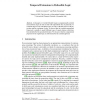3047 search results - page 152 / 610 » A Temporal Consensus Model |
ECML
2005
Springer
15 years 3 months ago
2005
Springer
Discriminative learning techniques for sequential data have proven to be more effective than generative models for named entity recognition, information extraction, and other task...
92
Voted
FOCS
1993
IEEE
15 years 2 months ago
1993
IEEE
: Weprove tight bounds on the time needed to solve k-set agreement, a natural generalization of consensus. We analyze this problem in a synchronous, message-passing model where pro...
AUSAI
2007
Springer
15 years 4 months ago
2007
Springer
In this paper, we extend Defeasible Logic (a computationally-oriented non-monotonic logic) in order to deal with temporalised rules. In particular, we extend the logic to cope with...
GLOBECOM
2006
IEEE
15 years 4 months ago
2006
IEEE
— A novel method is proposed for reducing the feedback rate of a transmit beamforming system with feedback of quantized channel state information. Specifically, the channel is m...
113
Voted
WLP
2004
Springer
15 years 3 months ago
2004
Springer
Abstract. We present a framework for a declarative approach to spatiotemporal reasoning on geographical data, based on the constraint logical language STACLP, which offers deducti...

